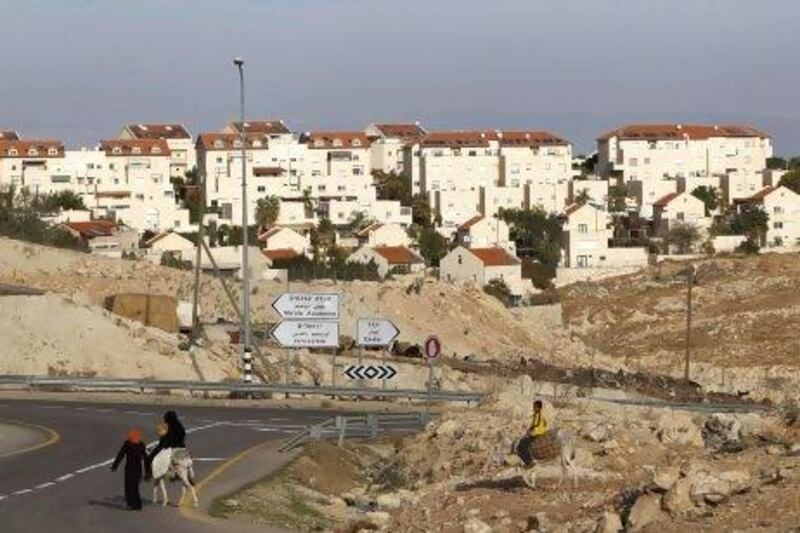TEL AVIV // Israel appeared to be on a collision course with key foreign allies yesterday after officials suggested drowing demands to reconsider erecting thousands of additional settler homes in the occupied West Bank and East Jerusalem would be rejected.
Australia yesterday added its voice to the five European countries who had already protested against Israel's building plans and its decision to suspend the transfer of tax money to the Palestinians in response to the UN's recognition of Palestinian statehood last week.
It signalled growing international impatience with Israel's hard-line policies.
Brazil and Egypt also summoned the Israeli ambassadors yesterday in further signs of global opposition to Israel's settlement policies.
Analysts said the condemnation of settlement growth suggested that the United States, European nations and other countries were upping the pressure on Israel to curb its building plns.
Yossi Alpher, a political analyst and former official in Israel's Mossad spy agency, said: "This looks like the beginning of a new approach. The Europeans would not have protested this without a green light from the US. In the second [US president Barack] Obama administration, we are looking at increased pressure from the West."
Mr Alpher said the international criticism was also a warning to Benjamin Netanyahu, the Israeli prime minister, to restrain settlement growth or face deteriorating Israeli ties with key allies, a development that could cost him votes during his re-election bid next month.
Israel announced the settlement plan on Friday to punish the Palestinians for successfully pursuing an upgrade at the UN to "non-member state" from "observer entity" despite Israeli and US opposition. The UN General Assembly passed the vote 138 to 9, with supporters including France, Spain and Italy while countries including Britain, Germany and Australia abstained, despite intensive Israeli lobbying for them to oppose the resolution.
Yesterday, Israel also said it would advance plans to construct 1,600 settler homes in the sensitive East Jerusalem neighbourhood of Ramat Shlomo.
That project had been mostly dormant since 2010, when it raised a diplomatic rift with the US because it was announced during the visit of Joe Biden, the US vice president, in Jerusalem.
Australia's calling in of Israel's ambassador in Canberra yesterday - a diplomatic gesture indicating a country's deep displeasure with another's action - followed similar such moves a day earlier by Spain, France, Britain, Sweden and Denmark. Bob Carr, Australia's foreign minister, said in a statement that he was "extremely disappointed with these reported Israeli decisions".
Washington has also demonstrated unusual criticism of Israel's action. On Monday, a spokesman urged the Israeli government to reconsider the settlement plan, which also called for starting construction on a controversial West Bank settlement project known as "E1," which critics say could ruin the bid to create a Palestinian state.
Yesterday, Dan Kurtzer, a former US ambassador to Israel who now teaches at Princeton University, was cited by Haaretz newspaper as calling the Israel move a "low blow" against the White House.
He said Israel appeared to convey to the US that it was no longer bound to pledges to avoid building in E1 because Mr Obama refused to commit to a 2004 letter by then-US president George W Bush to Israel suggesting Israel may keep large settlement blocs in any peace pact.
Despite the snowballing condemnation, Israel yesterday refused to budge from the settler home plans.
Zvi Hauser, the cabinet secretary, told journalists that "if anyone thinks that because of pressure Israel won't build in Ramat Shlomo, then he doesn't understand the map of Israeli interests" around Jerusalem. Danny Ayalon, the deputy foreign minister, played down the international criticism, saying that "it's not the end of the world."
Some analysts say Israel's measures are a negotiating tactic against any Palestinian attempt to take legal action against Israeli political or army officials at The Hague-based International Criminal Court - which the Palestinians' new UN status would enable them to do.
Mr Alpher, the political analyst, said: "Mr Netanyahu may be creating a bartering setting in which he's telling [Palestinian President] Mahmoud Abbas, 'let's make a deal, I'll give you the taxes and delay building and you commit not to go to the international court'."
In the meantime, however, Palestinian leaders say they may turn to the International Criminal Court if Israel pursues settlement plans. Nabil Shaath, a senior figure in Mr Abbas's Fatah party, was quoted by the Associated Press news agency yesterday as saying that "Israel is pushing us and forcing us to go to the ICC" by advancing its settlement activities.
Israel's hard-line approach to the Palestinian UN bid has also drawn some criticism at home from commentators blasting Mr Netanyahu for trying to gain pre-election backing from pro-settler voters at the expense of alliances with world powers.
The Haaretz newspaper yesterday publicised a caricature depicting Mr Netanyahu and Avigdor Lieberman, the ultranationalist foreign minister and a settler, donning hard hats and pushing wheelbarrows full of building materials towards a partly-built structure, with the premier saying: "We'll always have Micronesia." Micronesia was one of four tiny island states in the West Pacific making up almost half of the nine-country opposition voting against the Palestinian recognition bid in the UN last week. Micronesia typically votes similarly to the US, Israel's staunchest ally, from which it is reported to receive several billion dollars in aid in the next decade.





